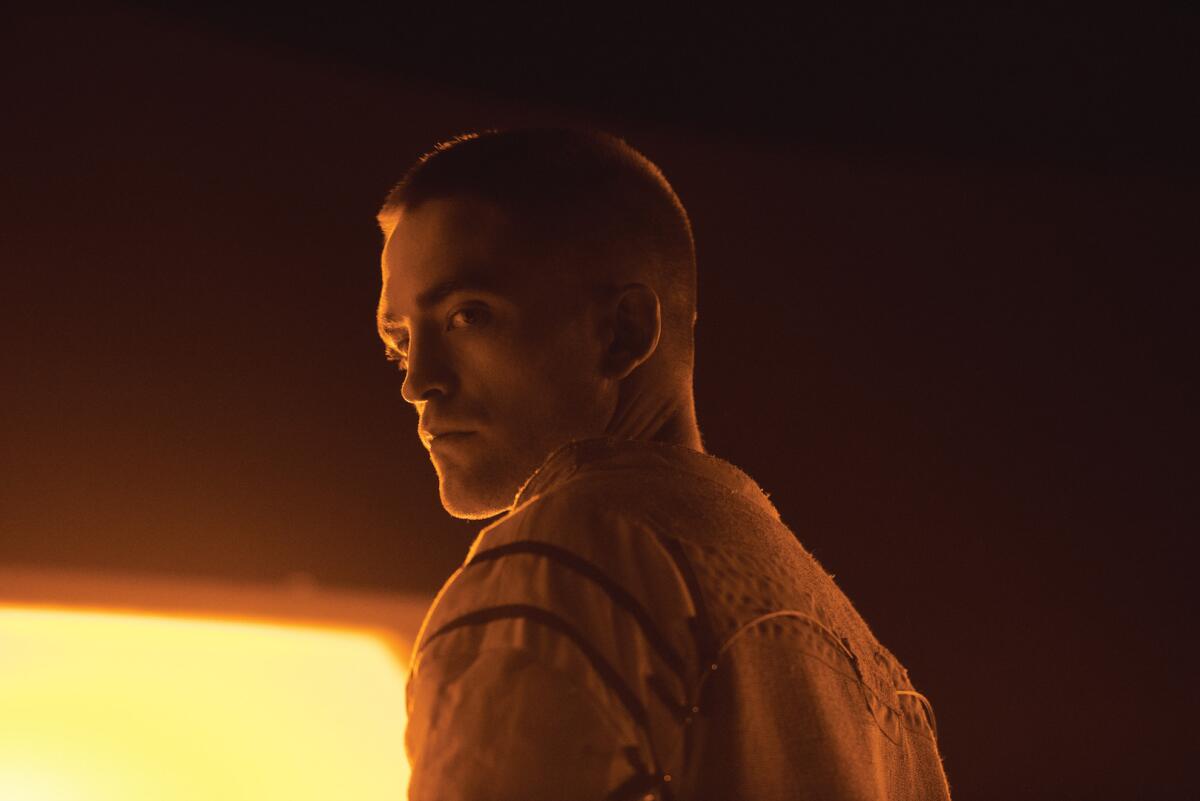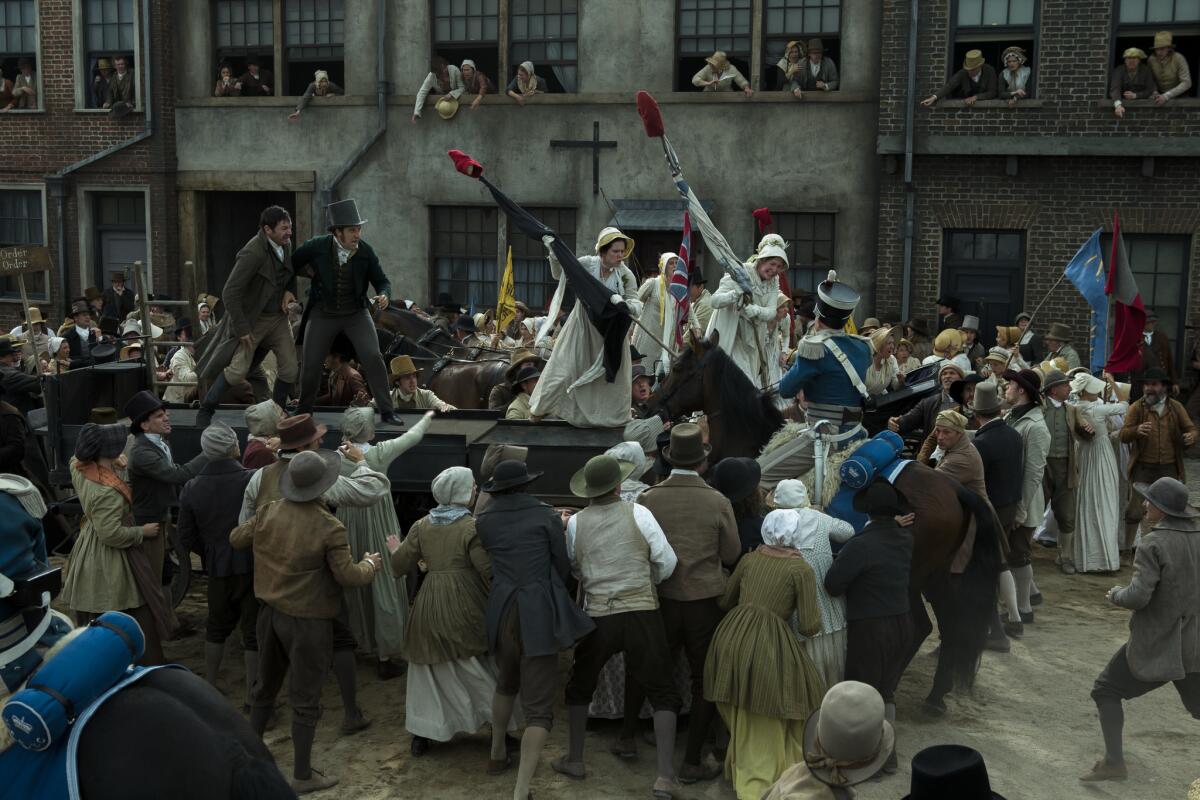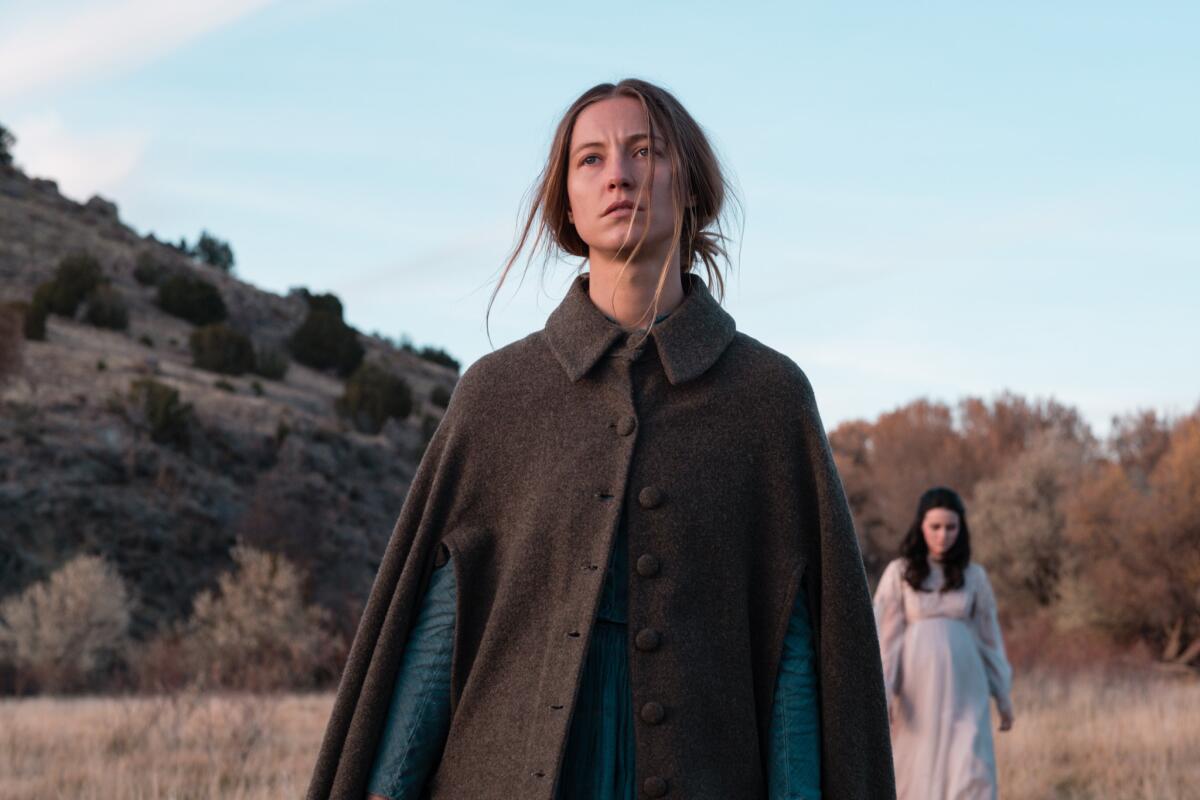Indie Focus: Spacing out with ‘High Life’
- Share via
Hello! I’m Mark Olsen. Welcome to another edition of your regular field guide to a world of Only Good Movies.
This is a time of year when it can feel like there’s a zany grab bag of new releases, but that also means lots of unexpected discoveries.
Such as, the new adaptation of Stephen King’s “Pet Sematary,” directed by Kevin Kölsch and Dennis Widmyer. For our entertainment podcast “The Reel,” I spoke to one of the film’s stars, Amy Seimetz. A familiar presence as an actress and filmmaker on the independent film scene, this is her first leading role in a studio film.
On what horror filmmaking means to her, Seimetz said, “It’s almost like the audience is giving you permission to make a giant art film. You get to make monsters and talk about the id of human beings and make these very strange leaps of reality. And you can go into these surreal territories, but the audience is there with you and wants it to happen.”
Jen Yamato spoke to Mary Lambert, director of the 1989 version of “Pet Sematary,” who spoke about her own vision of the story, saying, “I could just see it the way I was able to see fairy tales when I was a little girl — how this beautiful family would have this beautiful, idyllic house, but under the surface there would be this horror.”
Yamato will also be publishing an story on Kölsch, Widmyer and the new “Pet Sematary” soon.
The concert film “Amazing Grace,” got a limited release run late last year, but is now back in theaters. Times music writer Randy Lewis wrote about the story behind Aretha Franklin’s 1972 recording sessions at the New Temple Missionary Baptist Church in Los Angeles that are documented in the film, including talking to choir director Alexander Hamilton about those fateful performances.
And before she stepped into the role of “Captain Marvel,” Brie Larson directed and starred in “Unicorn Store,” which is now available on Netflix. I spoke to Larson about the film when it premiered at the 2017 Toronto International Film Festival.
In book and film news, the Los Angeles Times Festival of Books is coming up April 13-14. On the first day of the festival, after a screening of Victor Fleming’s 1933 pre-code romantic comedy “Bombshell” starring Jean Harlow, I will lead a conversation with Karina Longworth, author of the essential new book “Seduction: Sex, Lies and Stardom in Howard Hughes’s Hollywood.” Tickets are still available online.
We’ll have more screening events coming up soon. For info and updates, go to events.latimes.com.

‘High Life’
Though still relatively little known in the U.S., the French filmmaker Clarie Denis is widely acclaimed on the international festival circuit. Her profile in the States may get a boost from the new “High Life,” a dark, deeply philosophical science-fiction thriller staring Robert Pattinson, Juliette Binoche, Mia Goth and André Benjamin as people on a prison ship in the remote reaches of outer space.
In reviewing the film for The Times, Justin Chang wrote of Denis’ distinctive take on the sci-fi film, saying, “Her unsettling achievement here is to turn some of the conventions of her chosen genre inside out, to suggest that we have less to fear from the great, sterile void of the cosmos than from our own messy biological imperatives .… The story — a dying ship, a doomed crew and a deranged experiment — may sound like the stuff of ‘Alien’ and countless gory imitators, but rarely have you seen these elements reconfigured with such an exquisite commingling of tenderness and brutality.”
Chang also wrote a career appreciation of Denis’ work, declaring she “has long been one of the world’s greatest narrative filmmakers.”
I interviewed Denis just ahead of the film’s world premiere back in September in Toronto. On casting Pattinson she said, “I was a little bit afraid because as I said, he is an iconic actor and I wanted a sort of mysterious film, not an iconic film. But then I realized Robert was so ready to go anywhere with me. And then I realized he is a very mysterious young man.”
For those curious about Denis’ work, the American Cinematheque will be screening seven of her films April 12-14. I will be moderating a talk with the filmmaker before a double-bill of her debut feature, 1988’s “Chocolate,” and her 2009 film “White Material” on the first night.
Reviewing “High Life” for the New York Times, Manohla Dargis wrote, “Pattinson’s vivid presence and intimate voiceover help shape a movie that often feels on the verge of disintegrating .… Too often the ideas here, visual and otherwise, feel haphazard — outer and inner space, Pattinson’s head, sexual taboo, apocalypse now or maybe then — more like material for a vision board than a fully realized vision.”
At Vanity Fair, K. Austin Collins wrote, “You know you’re watching a Claire Denis movie when it dares to announce its perverse psychological undercurrents from the get-go, just speaks them aloud to spare us the effort of having to suss them out. And you know you’re in a Denis movie set in outer space when the movie goes out of its way to disobey all the rules — of genre, yes, but even of gravity.”

‘Peterloo’
The latest from British filmmaker Mike Leigh, “Peterloo” is a sweeping drama with a rather sprawling cast about an incident of political violence in 1819 Manchester that is still relatively little known, even in England.
Reviewing the film for The Times, Kenneth Turan said, “‘Peterloo’ is a paradox. Historical and contemporary, epic and intimate, political and personal, it is both unlike anything writer-director Mike Leigh has done before and the grand culmination of his career.”
For The Times, David Gritten spoke to Leigh. Of the film’s themes of class struggle and discord, Leigh said, “When we decided to do it, it seemed it would have things to say which would be relevant — the interesting thing being that in the five years since I made that decision, curiously it has become even more prescient and relevant.”
For Vulture, Emily Yoshida wrote of Leigh, “From backroom parliamentary reform organizing to the bustling magistrates’ mail rooms, he gives us an anatomy of a political movement and its ensuing tragedy, relaying events through an ensemble across a wide swath of class and political power. It’s a picture of history no less moving for its lack of concentrated interpersonal intimacy on any one character.”
At Time, Stephanie Zacharek noted, “The climax, as Leigh stages it, is both horrifying and deeply moving. ‘Peterloo’ shows what can happen when tyrants use brute force. It also proves the ineffectiveness of swords and bayonets, or their modern-day counterparts, in breaking the will of the people.”

‘The Wind’
The feature debut for director Emma Tammi, “The Wind,” stars Caitlin Gerard and Julia Goldani Telles as two women on the frontier plains of the Old West, each perhaps seized by the supernatural.
Reviewing the film for The Times, Noel Murray wrote, “Gerard helps keep the movie focused on what it’s really about: the creeping madness which seizes someone who’s totally isolated .… ‘The Wind’ is ultimately more allegorical than literal. It’s not about history, or pioneer life, or bloodthirsty ghosts. It’s about a loneliness so overwhelming that it becomes terrifying.”
Reviewing the film for Variety, Jessica Kiang added, “The film is much more successful, however, as a feminized reworking of the western mythos .… A convincingly feminist melding of western legend and cabin-in-the-woods horror, but not in the way one might initially think, ‘The Wind’ doesn’t seek to make infallible heroes of its women, but to understand and empathize with even their most unforgivable acts.”
Email me if you have questions, comments or suggestions, and follow me on Twitter: @IndieFocus.
Only good movies
Get the Indie Focus newsletter, Mark Olsen's weekly guide to the world of cinema.
You may occasionally receive promotional content from the Los Angeles Times.








